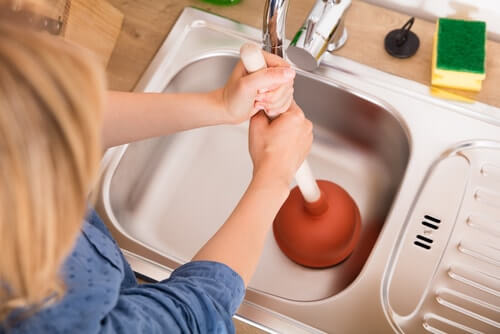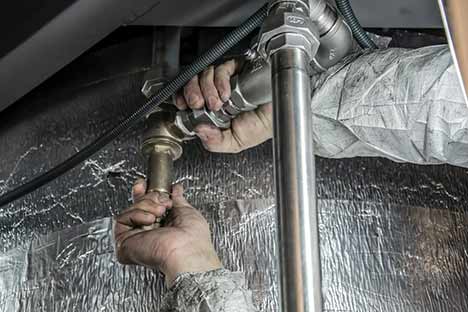Important Fixes for Emergencies: How to Until Support Arrives
Important Fixes for Emergencies: How to Until Support Arrives
Blog Article
The article author is making a few good pointers regarding Expert Tips for Emergency Plumbing Repairs as a whole in this content below.

Pipes emergency situations can strike any time, creating anxiety and possible damage to your home. Whether it's a ruptured pipeline, a clogged up drainpipe, or a leaking faucet, knowing how to take care of the circumstance till a specialist plumber gets here can conserve you from more complications. This short article offers crucial emergency situation pipes suggestions to help you mitigate damages and reclaim control throughout a pipes situation.
Shut off the Supply Of Water
The first step in any type of plumbing emergency situation is to shut down the supply of water. For localized concerns, such as a leaking tap or bathroom, shut off the valve near the component. In the case of a major leak or burst pipeline, locate your home's major water shut-off valve and turn it off quickly. Knowing the area of these shutoffs beforehand can conserve important time during an emergency situation.
Address Tiny Leaks with Momentary Fixes
Little leakages can rapidly end up being considerable problems if left unattended. Make use of these momentary fixes up until specialist assistance arrives:
While these solutions aren't permanent, they can aid minimize water loss and damage.
Unclog Drains Pipes Safely
A stopped up drainpipe can be an irritating and unpleasant issue. Below's just how to tackle it:
If these methods don't function, avoid using extreme force, as it might get worse the clog.
Manage Overflowing Toilets
An overflowing bathroom can create prompt disorder. Here's what you ought to do:
Turn off Your Water Heater
In certain emergency situations, such as a ruptured pipeline, it's a good idea to shut off your water heater. This protects against getting too hot or damage to the unit when water quits moving. Shut off the power supply to the water heater (electrical or gas) and allow it cool off to avoid possible risks.
Momentarily Stop a Ruptured Pipe
A ruptured pipe can bring about considerable water damages in minutes. To alleviate the issue:
Call a professional plumbing professional right away to resolve the problem completely.
Handle Frozen Pipeline Meticulously
In colder environments, frozen pipelines are a common emergency. If you presume a frozen pipe:
Prevent Additional Damages
Taking fast activity to decrease damage can save you time and money over time. Right here's just how:
. Have an Emergency Situation Plumbing Kit
Prepare a basic plumbing emergency set to deal with minor problems successfully. Your package must consist of:
Having these devices handy can make a considerable difference in your capability to handle emergencies.
Know When to Call a Professional.
While quick fixes can help temporarily, certain pipes concerns call for instant expert focus. Call a plumber if:.
Promptly speaking to an expert ensures the concern is fixed correctly and protects against additional problems.
Verdict.
Pipes emergencies can be frustrating, however with the best knowledge and devices, you can manage the scenario efficiently until assistance arrives. By switching off the water supply, resolving small leaks, and making use of short-term solutions, you can reduce damages and keep your home safe. Keep in mind, these tips are momentary options; constantly get in touch with a certified plumbing to manage the origin of the problem. Preparation and fast reasoning are your ideal allies in any kind of plumbing emergency situation.
8 Helpful Tips for Managing Plumbing Emergencies at Home
If your plumbing system hasn’t failed once, wait for it because almost everyone has a story to tell. Sometimes, it could be simple emergencies such as a leaking pipe, a blocked cistern, or even a big burst pipe. In situations like this, you need to have some handy tips to save you some money and from possible damages.
Take care of minor issues early.
Sometimes, you could have avoided an emergency by taking proactive measures while it was still early. Some major plumbing emergencies can be a result of an ignored minor issue. We recommend that you have items like plumbing tapes and other related items. A plumbing tape can allow you to manage minor leaks before the plumber arrives.
Cut off the water supply.
This tip is essential in almost any type of leakage problem. For problems like minor leakages in the toilet or kitchen, turn off the supply that takes water to the affected pipes. If the leakage is a major pipe, you must shut off the supply valve to the entire building. This will help you avoid flooding your home and neighbors if you share a flat.
Know your plumbing system
Folks typically move into a new apartment without understanding the water supply around the building. This can prove disastrous if a water emergency arises and the plumber is far away. The previous tip will prove useless if you don’t practice this one. More importantly, know where your water shut-off valve is located – you’ll need that knowledge to prevent potential home floods.
Have some common handy tools
There are lots of plumbing emergencies that you can handle without hiring a plumber. That’s why you must keep some tools available always. Some tools that you can use to fix simple plumbing emergencies easily include plumbing tapes, screwdrivers, thread seal tapes, plungers, pliers, tape measures, and rubber gloves.
Insulate your pipes from cold
You’ll save yourself from many plumbing expenses if you protect your water pipes from the cold. This is because of the harmful effects that cold weather can have on your pipes. During winter, your pipes can burst from being overly expected to freezing temperatures. So, make sure insulators are there to keep the pipes working correctly.
Avoid practices that will clog your toilet.
Many people indulge in practices that can damage the plumbing system of the entire building. One of these is when they use their toilet to dispose-off garbage. They flush all kinds of things, such as paper towels, bandages, hairs, female sanitary products, etc., down the toilet. This will block your toilet in the long run, incurring unnecessary expenditures. Dump such waste in the trash instead.
Check your dials regularly.
Sometimes, there could be leakages in your home without noticing them in time. So, constantly monitor your water meter dial. If the dial is reading when there is nobody using water, this is an indicator that there is leaking. Check for leaks immediately. Call a plumber as soon as possible if you can’t find any.
https://www.constructionplacements.com/8-helpful-tips-for-managing-plumbing-emergencies-at-home/

Do you really like more info about What to Do While Waiting for an Emergency Plumber? Create a review down below. We would be pleased to find out your opinions about this article. We are looking forward that you visit us again soon. Are you aware of somebody else who is fascinated by the niche? Please feel free to promote it. Kudos for being here. Kindly come visit our site back soon.
Request Estimate Report this page